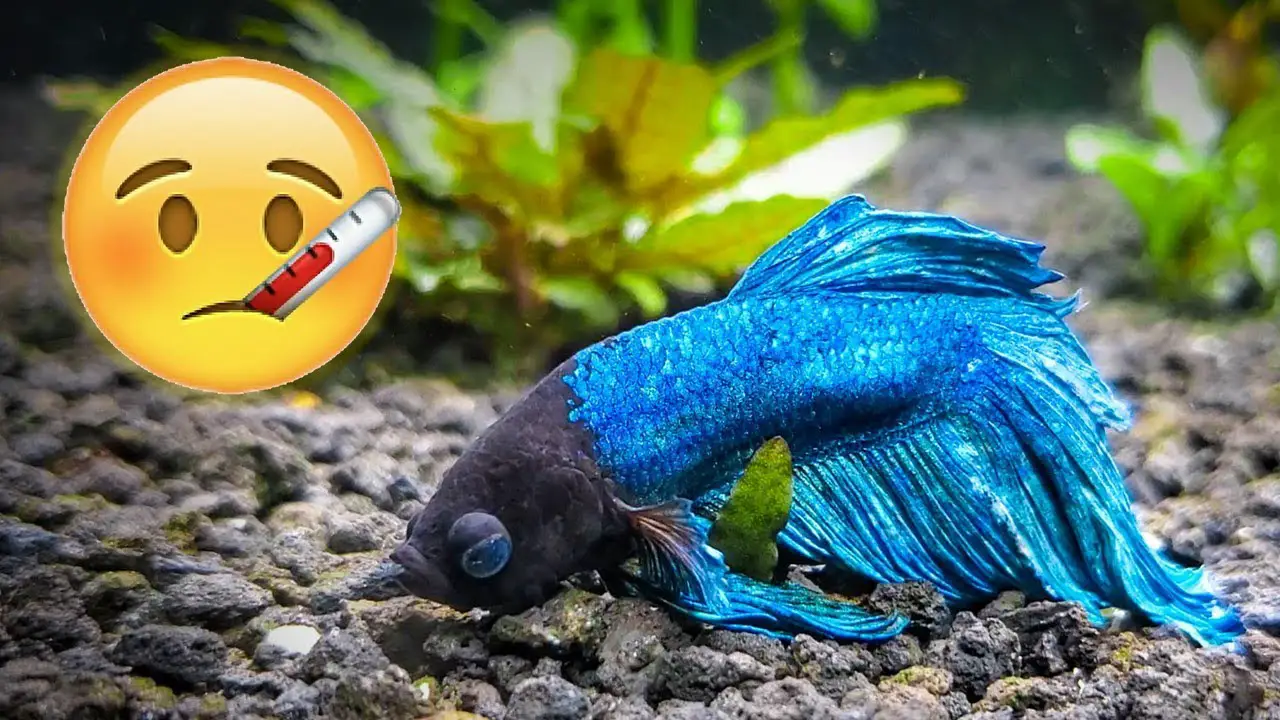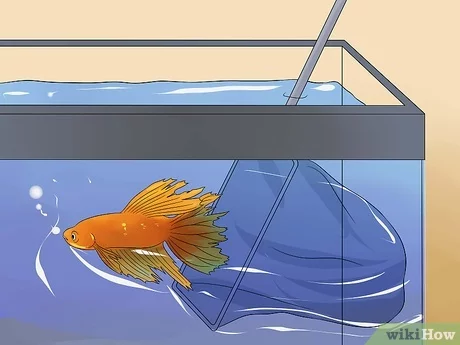Originally posted on May 5, 2023 @ 5:19 pm
Last Updated on 8 months by admin
Do you have a Betta fish that’s not looking too well lately? Are you worried about how to revive your sick or dying fish? Don’t worry, you’re not alone. Betta fish are known for their beautiful colors and vibrant personalities, but they can also be a bit delicate when it comes to their health.
In this article, we’ll discuss some of the common reasons why Betta fish get sick, the signs and symptoms to look out for, and most importantly, what steps you can take to revive your ailing fish. With the right knowledge and care, you can help your Betta fish recover and live a healthy, happy life. So let’s dive in!
How to Revive a Sick or Dying Betta Fish?
To revive a sick or dying betta fish, follow these steps:
- Change the water in the fish tank regularly, at least every week.
- Check the temperature of the water and adjust it to the optimal temperature range of 76-82°F.
- Feed the betta fish with high-quality food, and avoid overfeeding.
- Use appropriate water conditioners and aquarium salt to keep the water clean and healthy for the fish.
- If the fish is still sick, try using medication specifically designed for betta fish.
- Observe the betta fish for any signs of stress or illness, and act promptly to address any issues.

Reviving a Sick or Dying Betta Fish: Tips and Tricks
1. Identifying the problem
If you notice that your Betta fish is not acting normally, it could be a sign that something is wrong. The most common symptoms of a sick or dying Betta fish include lethargy, loss of appetite, and discoloration. It’s important to identify the problem as soon as possible, so you can take action to save your fish.
The first step in identifying the problem is to observe your fish closely. Look for any changes in behavior or appearance. Check the water quality and temperature, as these can also affect your fish’s health. If you’re unsure what’s wrong, consult a veterinarian or an experienced Betta fish owner.
2. Treating common Betta fish diseases
Some Betta fish diseases are more common than others. The most common diseases include Ich, Fin Rot, and Velvet. Each of these diseases requires a different treatment method.
Ich is a parasitic disease that causes small white spots on your fish’s body. To treat Ich, raise the temperature of the water to 86°F and add aquarium salt. Fin Rot is a bacterial disease that causes your fish’s fins to deteriorate. To treat Fin Rot, improve the water quality and add a medication that contains antibiotics. Velvet is a parasitic disease that causes a gold or rust-colored film to develop on your fish’s body. To treat Velvet, lower the water temperature and add a medication that contains copper.
3. Improving the water quality
One of the most important factors in keeping your Betta fish healthy is maintaining good water quality. Poor water quality can lead to a variety of health problems for your fish. To improve the water quality, make sure to change the water in your fish tank regularly. Use a water conditioner to remove any chlorine or other harmful chemicals from the water.
You should also test the water regularly to make sure the pH, ammonia, and nitrate levels are within the appropriate range. If the levels are too high, perform a partial water change and add a water treatment solution.
4. Feeding your Betta fish a balanced diet
Feeding your Betta fish a balanced diet is essential for maintaining good health. Betta fish are carnivores and require a high-protein diet. You can feed your Betta fish a variety of foods, including pellets, frozen or live brine shrimp, and bloodworms.
Make sure to feed your Betta fish small amounts of food several times a day, rather than one large meal. This will prevent overfeeding and reduce the risk of digestive problems. Avoid feeding your Betta fish human food, as it can be harmful to their health.
5. Providing a suitable environment
Betta fish require a suitable environment to thrive. They need a tank that is at least 5 gallons in size, with a heater to maintain a consistent temperature. The tank should also be equipped with a filter to keep the water clean and oxygenated.
Make sure to decorate the tank with plants and hiding places, as Betta fish like to have a place to hide. Avoid using sharp or rough decorations that could damage your fish’s fins.
6. Minimizing stress
Stress can have a significant impact on your Betta fish’s health. To minimize stress, make sure to provide a peaceful environment with minimal noise and activity. Avoid handling your fish too much, as this can also cause stress.
If you need to move your fish to a different tank, make sure to acclimate them slowly to the new environment. This will reduce the risk of shock and stress.
7. Using medication cautiously
If your Betta fish requires medication, make sure to use it cautiously. Follow the instructions carefully and only use the recommended dosage. Overusing medication can be harmful to your fish’s health and can lead to antibiotic resistance.
If you’re unsure how to administer medication, consult a veterinarian or an experienced Betta fish owner.
8. Knowing when to euthanize your fish
Sometimes, despite your best efforts, your Betta fish may not recover from illness or injury. In these cases, euthanasia may be the most humane option. If you’re unsure how to euthanize your fish, consult a veterinarian or an experienced Betta fish owner.
9. Preventing illness and injury
Preventing illness and injury is always better than treating it. To prevent illness and injury, maintain good water quality, provide a suitable environment, and feed your fish a balanced diet.
Avoid exposing your fish to extreme temperatures, sharp or rough decorations, and aggressive tank mates. Make sure to handle your fish gently and avoid overcrowding the tank.
10. Conclusion
Reviving a sick or dying Betta fish requires patience, knowledge, and dedication. By identifying the problem, treating common diseases, improving water quality, feeding a balanced diet, providing a suitable environment, minimizing stress, and using medication cautiously, you can give your fish the best chance of recovery.
Remember to prevent illness and injury by maintaining good water quality, providing a suitable environment, and handling your fish gently. With proper care, your Betta fish can thrive and live a long and healthy life.
Frequently Asked Questions
Here are some common questions about how to revive a sick or dying betta fish:
What are some signs that my betta fish is sick or dying?
There are several signs that may indicate a sick or dying betta fish. These include:
- Loss of appetite
- Clamped fins
- Lethargy
- Difficulty swimming or floating on one side
- Discoloration or spots on the body or fins
- Gasping for air at the surface of the water
If you notice any of these symptoms, it’s important to take action quickly to try to revive your betta fish.
What can I do to revive a sick betta fish?
If you suspect that your betta fish is sick, there are several things you can do to try to revive it:
- Check and adjust the water temperature and pH levels to ensure they are within the recommended range for bettas.
- Perform a water change to remove any toxins or pollutants that may be affecting your fish.
- Provide your betta with a clean and comfortable environment by removing any uneaten food or debris from the tank and adding fresh water and plants.
- Consider adding medications or treatments, such as aquarium salt or betta-specific medications, to help combat specific illnesses or conditions.
- Monitor your betta’s behavior and symptoms closely and seek the advice of a veterinarian or fish expert if necessary.
Remember that the key to reviving a sick betta fish is to act quickly and provide it with the best possible care and environment.
What should I do if my betta fish is not eating?
If your betta fish is not eating, it may be a sign of illness or stress. Here are some things you can do to encourage your fish to eat:
- Ensure that the water temperature and pH levels are within the recommended range for bettas.
- Try offering a variety of different types of food, such as pellets, flakes, or frozen foods.
- Consider feeding your betta smaller, more frequent meals throughout the day instead of one large meal.
- Remove any uneaten food from the tank to prevent it from fouling the water.
- Consider adding a little bit of garlic juice or other appetite stimulants to the water to encourage your betta to eat.
If your betta fish continues to not eat or shows other signs of illness, seek the advice of a veterinarian or fish expert as soon as possible.
Can stress cause a betta fish to become sick or die?
Yes, stress can have a significant impact on the health and wellbeing of a betta fish. Some common sources of stress for bettas include:
- Overcrowding in the tank
- Poor water quality
- Incompatible tank mates
- Inadequate or poor quality food
- Changes in water temperature or pH levels
To help prevent stress-related illnesses in your betta fish, it’s important to provide them with a clean and comfortable environment, appropriate tank mates, and high-quality food. Additionally, try to minimize changes to the water temperature, pH levels, and other environmental factors as much as possible.
How can I prevent my betta fish from getting sick or dying?
There are several things you can do to help prevent your betta fish from getting sick or dying:
- Provide your betta with a clean and comfortable environment by performing regular water changes, removing uneaten food and debris, and adding live plants.
- Ensure that the water temperature and pH levels are within the recommended range for bettas.
- Choose appropriate tank mates that are compatible with bettas and won’t stress or harm them.
- Feed your betta a high-quality diet that is appropriate for their species and age.
- Monitor your betta’s behavior and symptoms closely and seek the advice of a veterinarian or fish expert if you notice any signs of illness or distress.
By providing your betta with the best possible care and environment, you can help them live a long and healthy life.

In conclusion, reviving a sick or dying Betta fish can be a challenging and rewarding experience. While prevention is always the best course of action, it is possible to nurse your fish back to health with the right care and attention. Remember to keep the water clean and at the right temperature, provide a balanced diet, and be vigilant for any signs of illness or distress.
It’s important to note that not all Betta fish will recover from illness, as some conditions may be too advanced or difficult to treat. In these cases, it may be necessary to consider humane euthanasia to prevent suffering.
Ultimately, the best way to keep your Betta fish healthy and happy is to provide a comfortable and stimulating environment, and to stay informed about their needs and behaviors. With the right knowledge and care, your Betta fish can live a long and fulfilling life.
